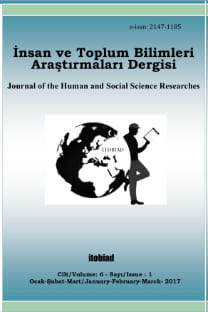Aristophanes’in Komedyalarındaki Perikles, Sokrates ve Kleon Karakterlerinin Politik Bir Değerlendirmesi
Aristophanes, Perikles, Sokrates, Kleon, Atina Demokrasisi
Political Assessment of the Characters of Pericles, Socrates and Cleon in Aristophanes’ Comedies
Aristophanes, Pericles, Socrates, Cleon, Athens Democracy,
___
- Kaynakça/ReferencesAntik Kaynaklar Aristoph. Akh. (=Aristophanes, Akherneis). Kullanılan Metin ve Çeviri: ARISTOPHANES. (1924). The Acharnians. (trans. B. B. Rogers), Aristophanes I içinde, 6-119, London: Loeb Classical Library.Aristoph. Eir. (=Aristophanes, Eirene). Kullanılan Metin ve Çeviri: ARİSTOPHANES. (2009). Barış. (çev. Y. Onay), İstanbul: Mitos-Boyut. Aristoph. Nub. (=Aristophanes, Nubes). Kullanılan Metin ve Çeviri: ARİSTOPHANES. (2010). Bulutlar. (çev. F. Akderin), İstanbul: Mitos Boyut.Aristoph. Orn. (=Aristophanes, Ornithes). Kullanılan Metin ve Çeviri: ARİSTOPHANES. (2010). Kuşlar. (çev. F. Akderin), İstanbul: Mitos Boyut. Aristoph. Ran. (=Aristophanes, Ranae). Kullanılan Metin ve Çeviri: ARİSTOPHANES. (2012). Kurbağalar. (çev. A. Selen), İstanbul: Mitos Boyut. Aristoph. Sph. (=Aristophanes, Sphekes). Kullanılan Metin ve Çeviri: ARISTOPHANES. (1924). The Wasps. (trans. B. B. Rogers), Aristophanes I içinde, 408-550, London: Loeb Classical Library.Aristoph. Plut. (=Aristophanes, Plutus). Kullanılan Metin ve Çeviri: ARISTOPHANES. (1924). The Plutus, (trans. B. B. Rogers), Aristophanes III içinde, 364-468, London: Loeb Classical Library.Aristot. Ath. Pol. (=Aristoteles, Athenaion Politeia). Kullanılan Metin ve Çeviri: ARISTOTLE. (1891). Constitution of Athens. (trans. T. J. Dymes), London: Seely and Co. Limited. Aristot. Rh. (=Aristoteles, Rhetorike). Kullanılan Metin ve Çeviri: ARİSTOTELES. (1995). Retorik. (çev. M. Doğan), İstanbul: YKY Yayınları.Aristot. Pol. (=Aristoteles, Politica). Kullanılan Metin ve Çeviri: ARİSTOTELES. (2015). Politika. (çev. F. Akderin), İstanbul: Say Yayınları.Hdt. (=Herodotos, Historiae). Kullanılan Metin ve Çeviri: HERODOTUS. (1989). (Herodotus IV, Books VIII-IX. (Trans. A. D. Godley), London: The Loeb Classical Library. Ksen. Mem. (=Ksenophon, Memorabilia). Kullanılan Metin ve Çeviri: KSENOPHON. (1997). Sokrates’ten Anılar. (çev. C. Şentuna), Ankara: Atatürk Kültür, Dil ve Tarih Yüksek Kurumu, Türk Tarih Kurumu, Pl. Apol. (=Plato, Apología). Kullanılan Metin ve Çeviri: PLATO. (1979). Apology of Socrates. (trans. T. G. West), London: Cornel University Press. Pl. Sym. (= Plato, Symposion). Kullanılan Metin ve Çeviri: PLATO. (2008). The Symposium. (trans. M. C. Howatson). Cambridge: Cambridge University Press.Plut. Per. & Fab. (= Plutarkhos, Perikles & Fabius). Kullanılan Metin ve Çeviri: PLUTARKHOS. (2011). Perikles & Fabius. (çev. M. Mete), İstanbul: İdea Yayınları.Plut. Sol. & Pop. (=Plutarkhos, Solon & Poplicola ). Kullanılan Metin ve Çeviri: PLUTARKHOS. (2005). Solon & Poplicola. (çev. M. Mete), İstanbul: İdea Yayınları.Thuk. (=Thukydides). Kullanılan Metin ve Çeviri: THUKYDIDES. (2017). Peloponnesos Savaşları. (çev. F. Akderin), İstanbul: Belge Yayınları.
- Modern KaynaklarColaiaco, J. A. (2001). Socrates against Athens, Philosophy on Trial. New York: Routledge.Croix, Ste. G. E. M. (1996). The Political Outlook of Aristophanes. Oxford Readings in Aristophanes içinde, 42-64, New York: Oxford University Press.Croix, Ste. G. E. M. (2013). Antik Yunan Dünyasında Sınıf Mücadelesi. (çev. Ç. Sümer), İstanbul: Yordam Yayınları. Çelgin, G. (1990). Eski Yunan Edebiyatı, İstanbul: Remzi.Demir, M. (2001). Genel Hatlarıyla Atina Demokrasisi ve Liderleri (M.Ö. 600-400). Arkeoloji ve Sanat, (103-104), 39-45. Dorey, T. A. (1956). Aristophanes and Cleon. Greece & Rome 3 (2), 132-139.Erhat, Azra. (1958). Aristophanes. İstanbul: Varlık. Finley, M. I. (1973). Democracy, Ancient and Modern. London: Chatto & Windus.Forrest, W. G. (1963). Aristophanes’ Acharnians. Phoenix, 17 (1), 1-12.Hose, H. F. (1940). Personalities in Aristophanes. Greece & Rome, 9 (26), 88-95.Lipson, L. (1964). The Democratic Civilization. New York: Oxford University Press. Olson, D. (1991). Dicaeopolis’ Motivations in Aristophanes’ Acharnians. The Journal of Hellenic Studies, 111, 200-203. Sina, A. (2011). Atinalı Perikles, Yaşamı ve Dönemi. Ankara: Tiydem.Smith, N. (1992). Political Activity and Ideal Economics: Two Related Utopian Themes in Aristophanic Comedy. Utopian Studies, 3 (1), 84-94.Storey, I. (1998). Poets, Politicians and Perverts: Personel Humour in Aristophanes. Classics Ireland 5, 85-135. Tracy, S. V. (2009). Aristophanes and Old comedy, Caricature and Personel Attack. Pericles: A Sourcebook and Reader içinde, 96-108, California: University of California Press. van Steen, G. (1994). Aspect of Public Performance in Aristophanes’ Acharnians. L’Antiquité Classique 63, 211-224. Weber, M. (1978). Economy and Society, an Outline of Interpretive Sociology, California: University of California Press, 1978.
- ISSN: 2147-1185
- Yayın Aralığı: 4
- Başlangıç: 2012
- Yayıncı: Mustafa SÜLEYMAN ÖZCAN
Sendikaların Güvencesiz İstihdam Süreçlerindeki Tepkileri Üzerine Bir Çalışma
FÜSUN ÇELEBİ BOZ, TURGUT BAYRAMOĞLU, ÖMER FARUK GÜLTEKİN
Safranbolu'da Kültürel Miras, Müze Kent Alımlaması ve Kentin Folklorik Sürdürülebilirliği
Mustafa BÖLÜKBAŞI, Elçin MACAR
Dış Ticarette Dikey Uzmanlaşma: Türkiye’de Endüstrilere Yönelik Bazı Tespitler
Reyhan ÖZEŞ ÖZGÜR, MEHMET ZANBAK
İç Müşteri İlişkileri Yönetiminin İç Girişimciliğe Etkisi Üzerine Bir Araştırma
Romantik İlişkilerde Öz Yeterlik Ölçeği Geçerlik ve Güvenirlik Çalışması
F. Selda ÖZSOYSAL, Aslı UZ BAŞ, Ferda AYSAN
Elektrik Tüketimi, Yenilenebilir Enerji Tüketimi ve Karbondioksit Emisyonunun Büyümeye Etkileri
